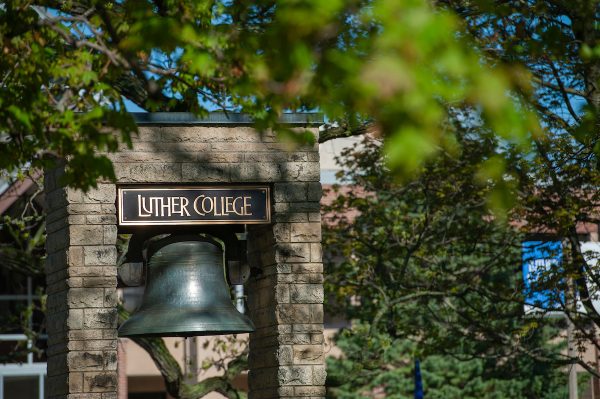Luther Music Department Forms Antiracism Task Force
Photo courtesy of Luther College
Professor of Music and Composer in Residence Brooke Joyce, chair of the Antiracism Task Force.
On October 1, 2020, the Luther College Music Department voted unanimously to create the Antiracism Task Force. Members continue to meet weekly to study the intersection of racism and music and make recommendations for policy changes in the music department. They ask that anyone in the Luther College community with a concern about racism on campus come to them and report the situation. The group consists of three faculty members, two staff and two students from the Luther College community.
The Antiracism Task Force was created in response to a growing call to combat systemic racism in the United States. The group works to combat racism in the Luther College community and Luther College Music Department.
The task force’s current goal is to update the music department’s existing mission statement, which states that “The Luther College Department of Music is committed to the study, development, and practice of the music arts in the lives of our students and in the community where we serve.” The group intends to clarify the department’s antiracist ideology and intentions in order to create a more inclusive atmosphere for the department and the broader Luther community.
Professor of Music and Composer in Residence Brooke Joyce is the chair of the Antiracism Task Force. Joyce leads the task force’s weekly discussions about racism in the music department. He was prompted by a sense of necessity to begin creating change on campus.
“I felt a sense of urgency after George Floyd’s murder to confront issues of racism in our department,” Joyce said. “The task force has given a platform for communication with students, staff, and faculty in our department. That communication creates conversation and those conversations reach other corners of the campus. It has a ripple effect of change.”
Joyce wanted to include students in the task force in order to gain an accurate understanding of the issues regarding racism in all sections of the music department. Phoenix Bradley (‘23), a music education major, was recruited as a member of the task force. Bradley joined the group after taking a course with Joyce. She hopes to contribute to the discussion of racism in the music department by sharing her voice.
“I’ve been given the space to say what I need to say to people who are trying to make a change,” Bradley said. “I just want a place where students of color can feel like they belong and can enjoy their time here. I want directors of all races and all types of backgrounds to understand how to teach things that aren’t their own history.”
Tam Ayers (‘23) is another student on the board. As a music education major, he is concerned with the intersectionality of music education and race. He hopes that through his participation in the Antiracism Task Force, he can create change in the curriculum.
“The biggest issue that I see at Luther is the way the curriculum is structured,” Ayers said. “I really want to see us start to think about revising the curriculum to provide more space for BIPOC composers and artists so we can learn about a variety of music history and musical styles.”
Assistant Professor of Music in Collaborative Piano Nicholas Shaneyfelt also serves on the Antiracism Task Force, engaging in weekly discussion with Joyce and the group’s other members. Shaneyfelt is interested in including the voices that may, without a platform, go unheard. He hopes to reinvent the music department’s mission statement to reflect these voices and their educational prerogative.
“[In order to learn about the diversity of perspective in music at Luther], the first task was to listen,” Shaneyfelt said. “We have opened up forums to listen to alumni and students, and recently to listen to music faculty. This was something we [the members of the Antiracism Task Force] thought was important. We strive to not speak or insert a voice into this until we feel like we have listened and have heard those that want to speak.”
Shaneyfelt hopes that by listening to the Luther College music community, he and the other members of the task force will be able to revise the music department’s mission statement to accurately reflect the voices of its faculty and the values of its larger body of participants.
As members of the Antiracism Task Force collaborate to amplify the voices of the unheard and revise the Luther College music department’s mission statement, they invite current students and alumni to contact members of the task force with any comments and suggestions. All information shared in this manner will be kept confidential by the task force.






